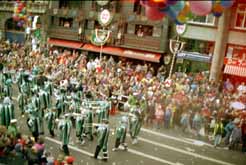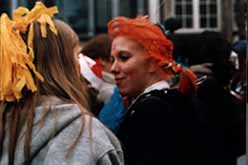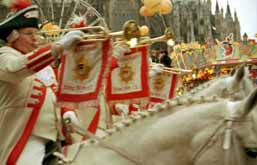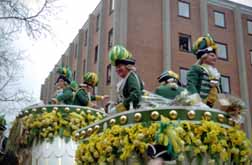
What is Fastnacht?
The Germany equivalent of Mardi Gras is known as Fasching, or Karneval. It is a celebration before the coming of Lent. It is like Mardi Gras in the fact that it ends on Shrove Tuesday which is the last day before Ash Wednesday. Fasching officially begins on November eleventh at the eleventh second of the eleventh minute past the eleventh hour, and reaches a riotous crescendo during the weeks before Shrove Tuesday. Wild parties, gluttony, and sexual promiscuity are found in abundance. In reality, for the first month and a half, Fasching pretty much takes a back seat to the Christmas holidays. Come New Year's Eve, known as Silvester, however, everything geht's los. Every weekend, bars and nightclubs are packed with people dressed in costumes from sexy to outrageous. Festivities rise to a fever pitch the last weekend before Ash Wednesday. Rosenmontag is the Monday before Ash Wednesday. It has nothing to do with roses, but rather stems from the slang word rasen, which means to rave and generally go wild. Faschingsdienstag is the last day of Fasching, with everyone getting in their last merrymaking before Lent starts.

History
European fasching has roots in ancient Egyptian rituals, sustained through the Roman period by the feasts of Bacchanalia and Saturnalia. Although the carnival attitude was somewhat lessened by the church in the Middle Ages, festivals still flourish today in France, Belgium, Italy and Germany.

Differences In North And South Germany
In the north, it's commonly called Karneval, and the biggest party seems to center around Cologne. In the south, especially in the region of the Black Forest, Fasching is often called Fastnacht and its roots are pagan.
The northern Karneval has its roots in Christianity. The whole season is intended as a celebration before the seriousness of Lent. It's similar to Carneval in Rio de Janeiro, Brazil and Mardi Gras in New Orleans, USA. The parades are quite a spectacle and are well worth seeing. Most are held the last weekend of Karneval or on Rosenmontag. The last Thursday of Karneval is called Weiberfastnacht, when women are allowed to act as brazen as they choose. For those men wearing a tie, this includes cutting the tie off with a pair of scissors.
In the south, especially in the region of the Black Forest, the season is known as Fasching or Fastnacht and its roots are pagan. Here the parades are not predominantly clowns, but witches and trolls. The old purpose of the Fasching was to chase away the spirits of winter. Similar to an American Halloween, children dress up in all manner of costumes, sometimes for parties at schools, sometimes just to feel the part as they watch their local parade. There are a few towns that are really known for their parades. The areas south of Stuttgart, Weil der Stadt and Rottenburg are considered to have the best. The parades are well worth seeing for the elaborate masks worn. These are true works of art, carved of wood, in the likenesses of witches, trolls, bears, or the Greenman (a sort of druidic forest creature).

Calender of Events for 1999
Jan 1-Feb16: Munich Fasching Carvnival - Black-and-white balls and masked balls. Various venues. For reservations call the promotors. Löwenbräu Cellar 49-89-526021; Deutsches Theater 49-89-5144360; Bayrischer Rundfunk 49-89-558080; Tollwood Olympic venue 49-89-45994780.
Feb 11-16: Cologne Carnival Funfair; Rudolphplatz, Roncalliplatz
Feb 11-17: Cologne 999 Years - "Those Were The Days" - Cologne Carnival City Centre; Carnival Festival Committee 49-221-574-000, fax 49-221-574-0026.
Feb 11-15: Düsseldorf Highlights of the Rhineland Carnival Women's Carnival Day - Street carnival on Königsalle Rose Monday Procession old town and city center. Düsseldorf Carnival Committee 49-211-330101
Feb.15: Düsseldorf Rose Monday Parade
Feb 11-16: Lindau/Allgäu - Traditional fun and games known locally under names such as Narrenwecken, Köfflerjuck and Buzentanz, Narren-baumlegen, and Moschkopftanz. Information from the tourist office 49-8382-260030; fax 49-8382-260026.
Feb 13-15: Freiburg Street Carnival and Rose Monday parade - The pagan tradition of driving out the winter with costumes and wild masks carved from wood is celebrated at the Alemannic Fasenet. Phone Breisgauer Narrenzunft 49-761-22611
Feb. 14: Braunschweig Carnival Parade - North Germany's biggest and Germany's fourth most important procession. For information, call Braunschweiger Carnival Committee 49-531-601153.
Feb. 15: Aachen Rose Monday Parade. For information call Aachener Carnival Club 49-241-470-3110.
Feb. 15: Cologne Rose Monday Parade. Cologne is considered the "home" of Fasching. For information call the Festival Committee at 49-221-574-000 or fax 49-221-574-0026.
Feb.15: Düsseldorf Rose Monday Parade. For information call the Carnival Committee 49-221-330101
Feb.15: Münster Rose Monday Parade. For information call 49-251-214313 or fax 49-251-787-700
Feb. 15: Mainz Rose Monday Parade. For information Mainz
Tourism Board at 49-6131-286210
Links:
Cat's
Page
Oompah
Page
Karneval